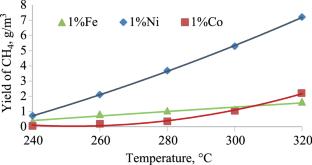碳氧化物在催化纳米分散体上的浆状反应器加氢
IF 1.1
4区 工程技术
Q3 CHEMISTRY, ORGANIC
引用次数: 0
摘要
本研究首次在连续搅拌槽浆体反应器(CSTR)中,在不预分离进料混合物的情况下,研究了催化分散剂的组成对CO+CO2混合物三相加氢性能的影响。结果表明,纳米分散体对特定加氢产物的选择性可以通过改变金属的性质来控制。其中Co-和fe -基分散体主要促进C2+烃的生成,ni -基分散体导致产物中甲烷占主导地位。本文章由计算机程序翻译,如有差异,请以英文原文为准。

Hydrogenation of Carbon Oxides in Slurry Reactor over Catalytic Nanodispersions
The study investigates, for the first time, the effects of the composition of a catalytic dispersion on its performance in three-phase hydrogenation of a CO+CO2 mixture in a continuous stirred-tank slurry reactor (CSTR) without pre-separating the feed mixture. It is shown that the selectivity towards specific hydrogenation products can be controlled by varying the choice of nature of the metal of nanosized dispersions. Specifically, Co- and Fe-based dispersions mainly promote the production of C2+ hydrocarbons, and Ni-based samples lead to the predominance of methane in the products.
求助全文
通过发布文献求助,成功后即可免费获取论文全文。
去求助
来源期刊

Petroleum Chemistry
工程技术-工程:化工
CiteScore
2.50
自引率
21.40%
发文量
102
审稿时长
6-12 weeks
期刊介绍:
Petroleum Chemistry (Neftekhimiya), founded in 1961, offers original papers on and reviews of theoretical and experimental studies concerned with current problems of petroleum chemistry and processing such as chemical composition of crude oils and natural gas liquids; petroleum refining (cracking, hydrocracking, and catalytic reforming); catalysts for petrochemical processes (hydrogenation, isomerization, oxidation, hydroformylation, etc.); activation and catalytic transformation of hydrocarbons and other components of petroleum, natural gas, and other complex organic mixtures; new petrochemicals including lubricants and additives; environmental problems; and information on scientific meetings relevant to these areas.
Petroleum Chemistry publishes articles on these topics from members of the scientific community of the former Soviet Union.
 求助内容:
求助内容: 应助结果提醒方式:
应助结果提醒方式:


